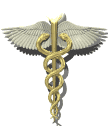
Endoscopic Sinus Surgery - Care
You will need to plan to be off of work for a few days. Possibly longer depending upon the type of job and extent of surgery.
Small packs will be removed from your nose on postop day 2 to 4. At two weeks your nose will be cleaned and debrided in the office using a fiberoptic scope. The cleaning is repeated at four weeks.
If the patient is a child, a single cleaning may be done at two weeks. This may require general anesthesia.
Until the packs are removed, you may need to wear a nasal dripper ( a gauze pad placed under the nose to catch secretions and blood. Your nose may have a bloody drainage for several weeks. This is because your sinuses may fill with blood and slowly clear.. However, the drainage should be clear not dark.
If active bleeding occurs, it can usually be controlled by using over-the-counter decongestant nose drops. Always check with your doctor first since decongestant drops may elevate blood pressure, strain the heart, and even lower insulin requirements for diabetes.
Endoscopic Sinus Surgery - Complications
1. Injury to the lining of the brain, meningitis, stroke and death - most common in the approach to the frontal sinus but may also occur in operations on the sphenoid and ethmoid sinuses
2. Injury to the carotid artery - most common in sphenoid sinus surgery. This is a disastrous and usually fatal complication. It may also result in stroke.
3. Injury to the orbit, eye and eye muscles. Most commonly the medial rectus muscle is injured, this can cause double vision. The optic nerve can be injured during sphenoid sinus surgery. Injury to the nasolacrimal duct can cause tearing.
4. Bleeding or air in the orbit. If this happens, blindness can occur due to pressure. Relief of the pressure is mandatory to prevent loss of sight.
5. Chronic pain and discomfort. A rare but reported complication.
6. Smoking is a relative contraindication to sinus surgery. If you smoke, recurrence of the disease and worsening of the symptoms is very likely.
7. Recurrence of polyps and sinus symptoms are common, especially in allergic patients. Sinus surgery DOES NOT CURE ALLERGIES.
8. Allergic reactions to drugs, bleeding,
infection and even death.